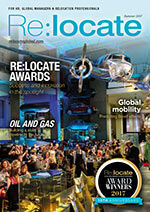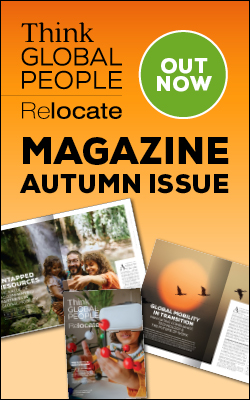Brexit: its impact on global mobility
How will Brexit affect global mobility and multinational companies? Michael F Dickmann, of Cranfield University, and Andrea Piacentini, co-founder of the RES Forum, share the results of new research.

Brexit’s effects on MNCs
The survey results paint an interesting picture. Global mobility (GM) experts foresee a number of challenging developments once the UK has finalised its exit from the EU, which is likely to be in 2019.Amongst the more upbeat assessments are the continued attractiveness of the UK as a destination country for potential assignees and the continued demand for assignees in the long term. Other evaluations show that the situation for MNCs will be more complicated, and probably more costly, after Brexit. For instance, the complexity of overall compliance work, including social security work, is likely to increase. Unfortunately, the difficulties for non-UK nationals entering the UK (as students or self-initiated expatriates) are expected to increase, resulting in the availability of such talent pools decreasing over time. Thus, firms expect that it will be harder to pursue such a talent-sourcing strategy.Many respondents cite exchange-rate movements after the Brexit decision that have led to a depreciation of the British currency. External housing demand may increase owing to the lower house prices for foreign buyers, which may mean higher GM housing costs for organisations. Several of the Brexit-related effects are seen as challenges for organisations that may decrease companies’ external talent availability and increase their costs. Indeed, in response to another question, 27 per cent of MNCs said that the number of inbound assignments would decrease as a result of Brexit, while no one said it might increase. In contrast, 19 per cent of firms think that outbound assignments from the UK may increase, while no one thinks that they will decrease in the future. Possibly as a result of the more negative perceptions that non-UK nationals living in the UK have about the hospitality and openness of Britain and the data indicating that many UK citizens would like immigration to be reduced (Migration Observatory, 2016), 27 per cent of respondents believe that the repatriation of assignees already working in the UK will increase. While many MNCs foresee no change in the willingness to expatriate, only a few think that the willingness of EU nationals in their organisations to go on assignment to the UK will decrease (12 per cent). Some also perceive a higher willingness of UK-based EU nationals to leave their assignments early (16 per cent).MNCs’ preparedness for Brexit
Many of the gloomy predictions made by economists and other commentators before the Brexit vote have not yet materialised. This has led the Bank of England to revise its estimates upwards.The degree of flexibility of companies to react to political events and uncertainty, as well as their ability to identify new opportunities, will become apparent over the next few years. Currently, there are many issues connected to Brexit that are unresolved. We wanted to understand the degree of insecurity related to these, and the resource implications.Almost half of the organisations surveyed (48 per cent) feel a fairly high degree of insecurity in relation to Brexit’s implications, and two out of five companies have a low degree of understanding of them.Of the respondents, 40 per cent believe that they will need substantial resources to react to Brexit’s challenges, and about a third think that their preparedness to cope successfully with these challenges is low.It is clear that our volatile, uncertain, complex and ambiguous (VUCA) world has presented MNCs with a substantial Brexit-related challenge that triggers insecurity and resource needs while necessitating strong and reactive leadership when the decisions and their implications for the EU and Britain become clearer.Meeting VUCA challenges
What are companies worried about, or what do they see as particularly challenging? Amongst the most prominent ‘known unknowns’ in the RES Forum were:- Further countries leaving the EU, and the breakdown that may occur
- Impact of Brexit on financial markets
- Lack of understanding of what is really going to happen
- Impact on EU nationals as regards visa/social security issues
- Rapid moves of currency exchange rates
- Retention of non-UK staff
- Short timelines for reactions
- Inability to respond accurately, and in detail, to staff questions
- Integrate VUCA factors into their decision-making
- Develop all managers (including assignees) to assess the external developments and find strategies to cope with them, both personally and through work
- Design flexible yet specific GM strategies, policies and practices for sub-groups, specific country demands, and location-specific challenges
The global context
What is the current level of preparation to respond successfully to threats and opportunities? Beyond Brexit, we asked how MNCs saw their response-readiness in relation to these broad challenges in a global context.The data shows that MNCs are unsuccessful in detecting trends and responding appropriately; 42 per cent disagree that their company is good at this, while only 27 per cent agree.About a third of respondents also disagree with various statements about the preparedness of their organisation to deal effectively with environmental challenges. Their responses indicate that about one in three organisations is having trouble in responding to security challenges, broader societal challenges, dealing with skilled labour shortages, or mastering their volatile environment.However, threats in relation to uncertainty and more protectionist views at national level are seen as being far more successfully mastered.MNCs are well advised to devote leadership attention and their creative capabilities to understanding not just the threats but also the opportunities that Brexit and other geo-political environments entail.Many companies have the capabilities to master these challenges successfully and react flexibly to VUCA developments in order to build on their strengths and exploit new opportunities in the wake of these momentous developments.To request a free copy of the full report, email office@theresforum.comThe RES Forum was created in 2006 as an independent community for international HR and mobility professionals. It is now the largest and most active network specialising in global mobility survey data, modelling and analytics.Read more about the effects of Brexit on relocation in the Summer 2017 issue of Relocate magazine.
 Access hundreds of global services and suppliers in our Online Directory
Access hundreds of global services and suppliers in our Online Directory © 2017. This article first appeared in the Summer 2017 edition of Relocate magazine, published by Profile Locations, Spray Hill, Hastings Road, Lamberhurst, Kent TN3 8JB. All rights reserved. This publication (or any part thereof) may not be reproduced in any form without the prior written permission of Profile Locations. Profile Locations accepts no liability for the accuracy of the contents or any opinions expressed herein.
© 2017. This article first appeared in the Summer 2017 edition of Relocate magazine, published by Profile Locations, Spray Hill, Hastings Road, Lamberhurst, Kent TN3 8JB. All rights reserved. This publication (or any part thereof) may not be reproduced in any form without the prior written permission of Profile Locations. Profile Locations accepts no liability for the accuracy of the contents or any opinions expressed herein.






























